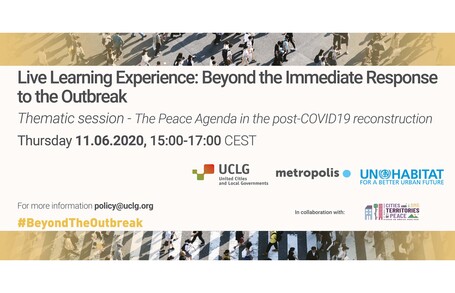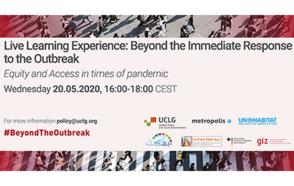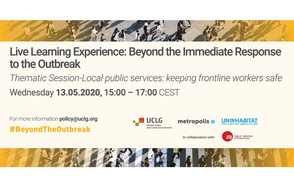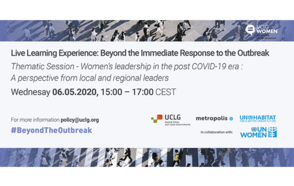
The COVID-19 pandemic has deepened many of the inequalities of which we were already aware, and has affected coexistence in our cities and territories during the confinement situation. Local and regional governments around the world have been at the forefront in this regard as well, putting service provision at the center, seeking to develop governance that puts people at the center, and of course developing a culture of peace so that the health crisis does not become a social crisis.
The Live Learning Experience, organized by UCLG, Metropolis, and UN Habitat, has brought together more than 3,000 participants in sessions that began at the end of March. Participants from local and regional governments, the UN system and partners from civil society have shared their experience, initiatives, and actions to support their communities and address the pandemic by providing essential basic services
The session that took place on June 11, organized in collaboration with the World Forum on Cities and Territories of Peace that will celebrate its third edition in 2021, addressed the agenda of local governments for peace and set the course for the Forum in Mexico City.
Diana Alarcón, General Coordinator of Advisers and International Affairs of Mexico City, on behalf of the World Forum on Cities and Territories of Peace, framed the conversation by noting that the pandemic has shown not only the importance of public space, but also the importance of the right to the city. She also pointed out the commitment of Mexico City to peace and addressed that the next Forum would focus on human rights, the right to the city, and cultural, social and environmental rights. Because to rebuild our cities, the axis must be peace, in a vision in which citizens are at the center.
“The construction of peace must be done with regards to the human and social rights of all people. It must be a positive peace, which is built on economic development, universal access to basic services, culture, health, housing”
The Secretary General of UCLG, Emilia Saiz, pointing out the path taken since the second World War in terms of peace, and encouraging to build on this for the current crisis situation. Ms Saiz pointed out that, for UCLG, the concept of peace is not contrary to that of conflict, which is inherent to societies, but rather to the concept of violence, and that it is the task of local and regional governments to work to prevent situations of inequality and tensions from escalating and becoming situations of violence.
"Local and regional governments are key in developing a new diplomacy that is truly transformative, that builds the foundations of peace and that does not just negotiate it. This diplomacy will be key so that, with the lessons learned during COVID, we can better face future challenges”
Octavi de la Varga, Secretary General of Metropolis, pointed out that sometimes the phases of violence are not visible at first glance, and that it is the task of local governments to make conflicts visible to prevent them from escalating and that it is essential to have a gender approach to avoid escalations of violence in our cities that attack the most vulnerable populations.
“Without peace, there is no trust or feeling of belonging to a city or community. Peace, trust, and belonging are at the heart of cities and the right to the city”
The first round table of the session addressed the agenda of the cities and territories of peace, and was chaired by Diana Alarcón. Patricia Torres Ray, State Senator for the State of Minnesota, started this round table by mentioning how, in her state and after the protests that have arisen after the death of George Floyd, the communities are asking for the reform of the police system to end inequalities of treatment. Grassroots activism and work, she noted, is key to making changes take place locally and globally. This sentiment was shared by Nadine Burbar, Chief of Resilience of Ramallah, who pointed out that the consolidation of peace is key to having resilient cities and communities, and for this it is essential to have communities at the center of efforts, promoting citizen participation and the solutions that come from the ground.
Vladimir Rodríguez, High Counselor for the Rights of Victims, Peace and Reconciliation of Bogotá, pointed out that the outbreak has generated an increase in urban violence, and this has generated a situation of mistrust between citizens and institutions, and that it is necessary to develop conflict resolution mechanisms between the local and regional level. Antonio Carlos Lopez da Silva, Deputy Mayor of Praia, mentioned the importance of the 2030 Agenda as a transformative framework to achieve post-pandemic peaceful societies, involving informal communities and civil society.
The second part of the session, entitled "Peace in the time of COVID-19", sought to provide solutions to the question of how to deal with peace after the pandemic. Vasu Gounden, Executive Director of ACCORD, addressed the future of multilateralism and how it was important that, after the pandemic, we seek to strengthen intergenerational dialogue, and the inclusion of women and informal communities in this new system of multilateralism so as not to leave anyone behind.
Josep Mayoral Artigas, mayor of Granollers, pointed out that when it comes to building peace agendas, it is essential to find spaces for the joint work of multilateralism. The mayor also recalled the nine commitments that were adopted at the Madrid’s Cities of Peace Forum, pointing out the importance of building on them locally and internationally. Maria Deeva, City Councilor for Volgograd, recalled 75 years since the end of the Second World War and how the war had led to the first twinning efforts between cities, with Volgograd being a pioneering city in 1944.
Jaime Morales, Undersecretary for Human Rights of the Government of Mexico City, explained how Mexico City had sought, in the midst of the pandemic, to guarantee universal access to basic services to all the population, especially to groups of priority attention as older adults. Peace, he noted, is the value that guides the agenda of the government of Mexico City, and warned that it was essential not to return to the previous community, where inequalities and borders are the common denominator
Patrick Bwire, Program Coordinator in Charge of Peacebuilding at the Center for Conflict Resolution, noted the Center's efforts to map peace work in Uganda and how they had worked together with national, regional and local governments to carry out a study on SDG 16 and how to include the most vulnerable communities and populations in order to achieve it by 2030. The mayor of Bangui, Émile Gros Raymond Nakombo, pointing the importance for local governments, and especially local communities, to have access to economic resources. The inequality generated by the pandemic, he warned, is the element that puts peace at most risk, and it is necessary to have the means to maintain and care for peace so that it does not become an empty term.
Before the end of the session, the Peace Presentations took place. Representing the UCLG Peace Prize, Sanne van Amerongen noted the importance of local approaches in times of crisis, as they are important in promoting peaceful environments. She pointed out that this focus was the most important in granting the Second UCLG Peace Prize to the municipality of Arsal, within the framework of the UCLG Congress, for its work in pursuit of social cohesion after the Syrian war.
Representing the World Forum on Cities and Territories of Peace, Antonio Zurita, from UNDP-ART, explained that the forum is a multi-actor and multi-level meeting place with more than 20 international, national and local institutions on its organizing committee. At the same time, he pointed out the important role that local and regional governments can play in the construction of peace in their territories with adequate recognition, and established the way to the third Forum of Cities and Territories of Peace, which starts in June, and which will have a virtual event worldwide in October, which will be the path to the physical forum that will take place in Mexico City in 2021.
Octavi de la Varga, Emilia Saiz, and Diana Alarcón closed the session, pointing out the importance of linking peace work with local policies, and that now is the time to turn peace debates into world conversations, and that the peace debate that had just taken place could start fueling discussions for next year's Forum.
Live Learning Experiences will continue throughout June, taking place on Thursdays. Local democracy, which is a key part of UCLG's work, as well as security at the local level, will be the themes of upcoming live learning experiences involving cities from all over the world seeking to create new solutions for challenges that the pandemic has highlighted, now more than ever.
- Download the full press release here.
- Visit the #BeyondTheOutbreak dedicated page.
- Visit the CitiesForGlobalHealth platform.













